- Research
- Research Centers
- Journals
- Admission
- Introduction
- Programs
- Application
- Alumni & Giving
- Alumni Club
- Giving
The 2022 International Chinese Language Education Conference was held in Beijing on Dec 8. Yang Dan, president of Beijing Foreign Studies University (BFSU) and deputy secretary of the CPC BFSU committee, chaired the opening and closing ceremonies of the first Language Education and Cooperation Forum, one of the parallel forums of the conference.
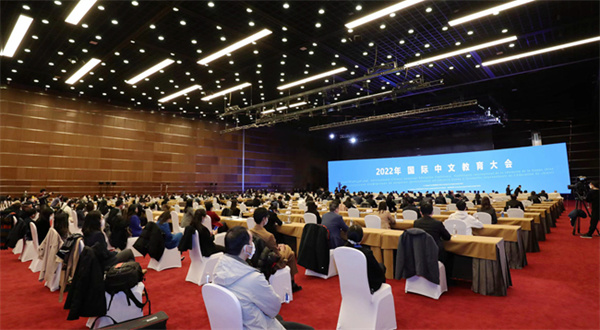
The first Language Education and Cooperation Forum is held online and offline on Dec 8. [Photo/bfsu.edu.cn]
With the theme of "connections, communications and understanding: building trust and cooperation through languages and culture", the forum, held online and offline, was hosted by the Center for Language Education and Cooperation (CLEC) under the Ministry of Education (MOE), and organized by BFSU and the Foreign Language Teaching and Research Press. More than 100 experts and scholars from all over the world, and representatives from more than 10 language and cultural institutions participated in the forum.
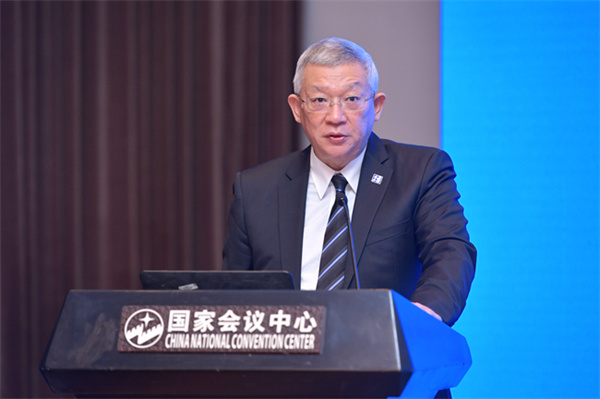
Ma Jianfei, director of the CLEC, addresses the opening ceremony of the first Language Education and Cooperation Forum. [Photo/bfsu.edu.cn]
Ma Jianfei, director of the CLEC, said that language is a carrier of civilization, and language and cultural institutions of all countries bear major responsibilities in deepening civilization exchanges and mutual learning. In a time filled with changes, these institutions are faced with great challenges and unity is the only path leading to stability and prosperity.
As a professional nonprofit institution for the development of international Chinese education, the CLEC has been committed to providing high-quality services for people around the world to learn Chinese and understand China, as well as building a platform for friendly cooperation, Ma said.
He noted that the center is willing to work together with more language and cultural institutions, and will continue to offer diverse teaching services and opportunities for mutual learning, promote mutual trust among people of all countries, and contribute to global cultural diversity and the building of a community with a shared future for mankind.
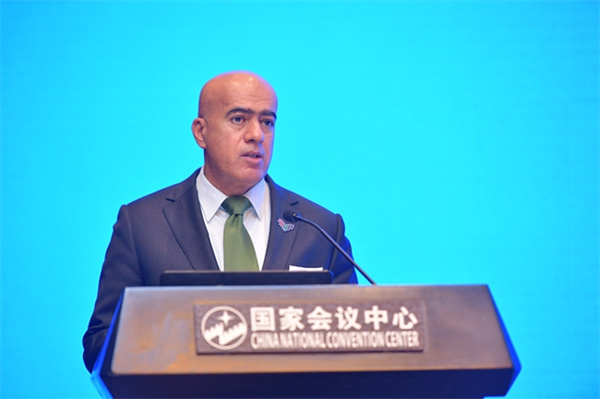
Ali Obaid Al Dhaheri, the UAE’s ambassador to China, addresses the opening ceremony of the first Language Education and Cooperation Forum. [Photo/bfsu.edu.cn]
Ali Obaid Al Dhaheri, ambassador of the United Arab Emirates (UAE) to China, said language is an important link connecting the world and the key to understanding the cultures of various countries.
Dhaheri made special mention of the Sheikh Zayed bin Sultan Al Nahyan Center for Arabic Language and Islamic Studies at BFSU, funded by Sheikh Zayed bin Sultan Al Nahyan, the late president of the UAE, during his first visit to China in 1990. It has since become a significant academic center for studying Arabic and Islamic culture and cultivating such professionals in China.
In recent years, people of the UAE have shown great enthusiasm in learning Chinese, and a project initiated to teach Chinese in 100 schools across the country has developed rapidly. Mutual respect and equal treatment among different countries make dialogue, appreciation and harmonious coexistence among diverse cultures and civilizations possible, and language learning is one of the crucial steps in the process, Dhaheri noted.
Language and cultural institutions around the world shoulder the responsibilities of spreading their own languages and cultures, as well as promoting exchanges and mutual learning, the ambassador stated.
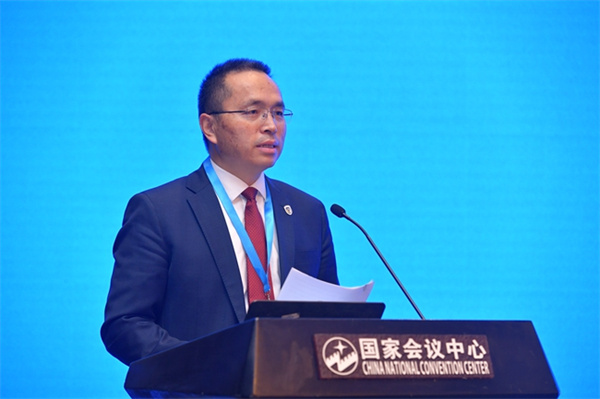
Yang Dan, president of BFSU and deputy secretary of the CPC BFSU committee, addresses the opening ceremony of the first Language Education and Cooperation Forum. [Photo/bfsu.edu.cn]
BFSU has always attached great importance to strengthening international cooperation in language education, actively promoted the building of a language community, and advocated for the coexistence, interaction and sustainable development of languages, Yang said.
He made three proposals for foreign language education in the future: upgrading the current international Chinese education into global Chinese education, moving from exam-oriented tutoring to application-oriented teaching, and transforming foreign language education into relevant services.
The university is willing to expand its connections, cooperation and friendships with language and cultural institutions from countries across the globe, and make more efforts in global language education, research, services and protection to enhance mutual trust among civilizations and international understanding, as well as to jointly create a better future, Yang added.
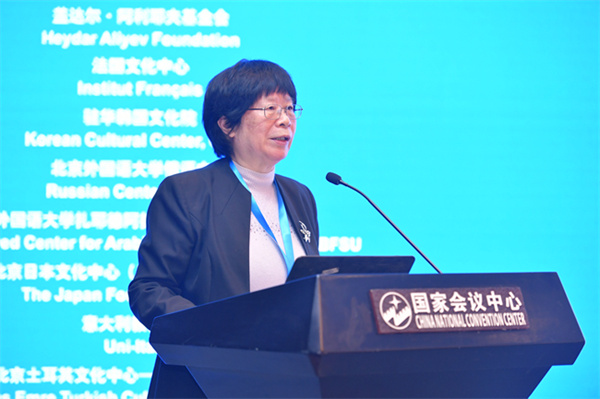
Wen Qiufang, director of the Xu Guozhang Institute for Advanced Studies in Linguistics and a professor at the National Research Centre for Foreign Language Education at BFSU, delivers a keynote speech at the opening ceremony of the first Language Education and Cooperation Forum. [Photo/bfsu.edu.cn]
Wen Qiufang, director of the Xu Guozhang Institute for Advanced Studies in Linguistics and a professor at the National Research Centre for Foreign Language Education at BFSU, delivered a keynote speech titled “the improvement of national linguistic competence and the building of a community with a shared future for mankind”.
Wen explained the connotations and relationship between China's national linguistic competence and individual linguistic competence, introduced the development of China's national language ability and summarized the changes of the development direction and content of international Chinese education in recent years. She also shed light on the role language, cultural exchanges and cooperation play in promoting dialogue, consultation, mutual learning, and the building of a community with a shared future for mankind.
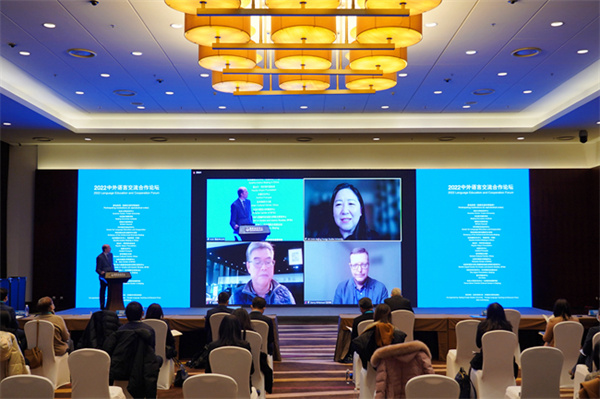
The first Language Education and Cooperation Forum includes a roundtable discussion. [Photo/bfsu.edu.cn]
The forum included a roundtable discussion for case sharing and the exchange of views on future language learning methods and inter-institutional cooperation. Four sub-forums, themed on “case studies on the role of language and cultural institutions in boosting cultural understanding”, “language teaching and assessment”, “the impact of educational cooperation, mobility and exchanges” and “collaborations and partnership through languages, arts and culture”, were also held.

The Joint Initiatives for International Language Education and Cooperation are released at the first Language Education and Cooperation Forum. [Photo/bfsu.edu.cn]
The forum also saw the release of the Joint Initiatives for International Language Education and Cooperation, which were initiated by the CLEC and responded by the British Council and nine other international language agencies.
The Initiatives thoroughly elaborated on the missions and responsibilities shouldered by language and cultural institutions, and proposed the basic principles and methods of inter-institutional exchanges and cooperation.